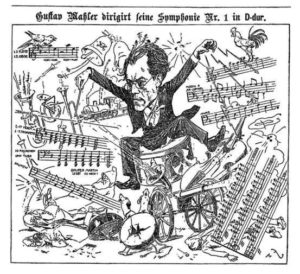
Gustav Mahler (1860-1911) was the greatest opera composer never to have composed an opera.
Huh?
Once again: Gustav Mahler was the greatest opera composer never to have composed an opera.
That statement is intended to be neither ironic nor provocative. Nor, well, stupid.
I would explain.
Compositionally, Mahler was, from the first, a dramatist: when composing, he thought in terms of dramatic scenarios. Whether a given work is instrumental or vocal, Mahler’s music, like Beethoven’s mature music before him, describes some sort of narrative, be it allegorical, metaphorical, or programmatic. Mahler came to his narrative impulse honestly. Along with the hyper-expressivity that was his late-nineteenth century German Romantic heritage, he was – like pretty much every German-speaking composer of his generation – a dyed-in-the-wool fan-person of Richard Wagner and the expressive ethos that drove Wagner’s music dramas. That Wagnerian ethos posited that music and literature must be combined to create archetypal stories/fables that resonated with the deepest of human impulses and experiences.

Mahler took this ethos for granted as a composer, and it was something he put into action on a daily basis as a conductor. Mahler conducted opera for a living, and starting in 1880 at the age of twenty, he climbed the operatic ladder across Bohemia, Austria, and Germany before reaching the pinnacle in April 1897, when he was hired as conductor of the Vienna Imperial Opera and appointed its Music Director six months later.
It was a position he richly deserved. Not only was Gustav Mahler the greatest opera conductor of his time but, after Richard Wagner and Wagner’s protégé Hans von Bülow, perhaps the greatest Wagner conductor of all time.
Mahler’s debut performance with the Vienna Imperial Opera attests to this. It was a performance of Wagner’s Lohengrin scheduled for May 11, 1897, for which Mahler was allotted one – you read that correctly – uno, eins, odin (Russian), jeden (Polish), wahed (Arabic), ONE freaking rehearsal.
Given his reputation as a conductorial tyrant, Mahler expected problems at this one-and-only rehearsal, his first with the members of the Imperial Opera. But there were no problems because, one, Mahler was a top-end pro, the real deal, and the performers recognized a pro when they saw him and, two, the performers were top-to-bottom pretty much the best in the business and Mahler recognized top-end pros when he saw and heard them.
Mahler told his friend, the violist Natalie Bauer-Lechner, that he had never before conducted an orchestra with such an ability to immediately grasp and execute his ideas:
“I got further with them in one rehearsal than after years with others. The chief credit must go to Austrian musicianship: the vitality, the warmth, and the great natural gifts which each man brings to his work.”
Every review and reminiscence of the debut performance recalls Mahler’s magical, almost mystical triumph, with the audience spontaneously applauding every time he used an unfamiliar tempo or did anything out of the ordinary (this was an audience that knew its Lohengrin!).
But the single most moving account of that performance is in the form of an anonymous letter Mahler received from one of the orchestra musicians the day after the performance.
“12 May, 1897
Your Excellency!
Most esteemed Herr Kapellmeister!
The following lines are written by one who has good reason to remain nameless. [For otherwise] I cannot speak freely, and therefore resort to writing anonymously. I hope that you will forgive me for doing so, since the only purpose of this letter is to tell you with what joy and enthusiasm your conducting of Lohengrin yesterday filled, not only this old musician and even older Wagnerian, but everyone who is an artist at all in the true Wagnerian sense. For a good 21 or 22 years, this writer has not heard the work played as it was yesterday under your baton.
Your tempi, your nuances and accentuation – all these were ‘Wagnerian’ in the fullest sense of the word. The Master himself conducted in this way; that is how it used to be played under his baton – no more, alas!
Your conducting is truly Wagnerian, for you know how to modify the tempo with perfect fidelity to the master’s intentions. No detail is lost, yet nothing is out of proportion within the framework of the whole.
Since Wagner and Hans von Bülow, I have never experienced conducting of such significance as yours.
Accept my most heartfelt gratitude, and my best wishes and blessings on your future.
With great respect,
An old musician.”
We return to my assertion that Gustav Mahler was the greatest opera composer never to have actually written an opera.
What he did compose – primarily – were symphonies: nine complete numbered symphonies, the beginning of a tenth, and the orchestral song cycle Das Lied von der Erde (“The Song of the Earth”, of 1909, which would have been numbered as being “Mahler’s Ninth” had not Mahler gotten weird about the whole “compose nine symphonies and then you die” thing).
Richard Wagner espoused the concept of “gesamtkunstwerke”: of music drama (he refused to use the word “opera”) as being an “all-inclusive art form.”
For Mahler, the genre of symphony became the “all-inclusive art form”: quoth Mahler, “a symphony must be like the world; it must contain everything.”… continue reading, and see the prescribed recording, only on Patreon!
